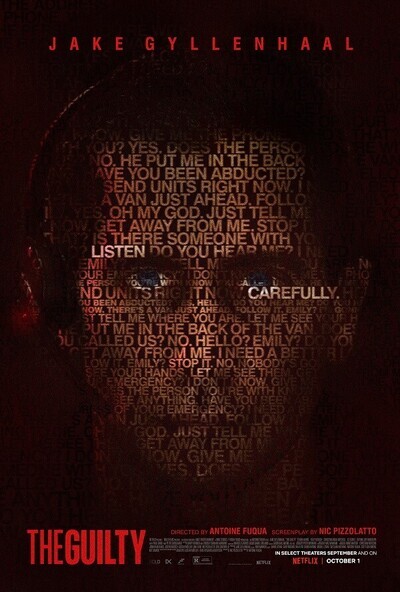Gyllenhaal Dispatches a Mediocore Drama
TV Review: Netflix’s The Guilty

Jake Gyllenhaal stars in one of Netflix newest Dramas: The Guilty. Unfortunately, the film seems to fall flat in certain areas.
The 2021 movie The Guilty takes the relatively common story of a police detective helping to solve a crime and flips it on its head. Unfortunately, the screenplay, which is directed by Antoine Fuqua, turns what could be a very intriguing story into merely an average movie.
The Guilty follows police detective turned 911 operator Joe Baylor, who is played by Jake Gyllenhaal as he works his last night shift on the job. From the first few minutes of the movie, it is clear that Baylor is struggling: he never seems to put down his asthma inhaler, his temper gets the best of him when speaking to callers, he constantly zones out, and is frequently startled (a sign of PTSD). As the story unfolds, the viewer learns that wildfires are ravaging California and it will be a busy night for Joe–but in more ways than one.
Joe is being pestered by a Los Angeles Times reporter for a statement about the next day’s court proceedings, and he is having disagreements with his wife. He also takes a call from a woman named Emily who claims to have been abducted by her husband Henry. Through intermittent calls with Emily, her husband, and their youngest daughter, Joe tries to understand and manage the situation. Unfortunately, his life seems to be crumbling around him and there’s nothing he can do–almost akin to the Coen Brothers’ movie A Serious Man. How does an individual square his or her personal problems with work? How does one survive in a world that seems to hold nothing? And how do we define and view guilt as a society? These are just a few of the questions that The Guilty hopes to answer.
Unfortunately, The Guilty doesn’t engage the audience as much as it should. This is primarily because much of the action is set in one place: the 911 call center where Joe works. It’s understandable that much of the suspense is meant to arise from Joe’s intense conversations with Emily and others, but these don’t do much. In the movie’s most intriguing moments, I found myself only engaged on the surface level. In other words, I was not on the edge of my seat or that interested. But for much of the movie, I struggled to pay attention. The repetitive nature of Joe taking call after call became monotonous and dull. This is not to say, though, that the idea behind the screenplay is a bad one. In fact, I think it could work quite well if readapted in the future (also with Jake Gyllenhaal as he did a fine job).
In a Sept. review of the movie, Peter Bradshaw of The Guardian said: “Inevitably, it’s a stagey set-up, and the dramatic effect of the closeup on the officer’s sweaty face and the distant voice on the other end of the line begins to diminish over time, so Gyllenhaal has to lose it more extravagantly with shouting and temper-loss and confessional agony.” Though, it added that “as time passes, it seems that the situation is more complicated than Joe thought – as is the question of who the title refers to.”
I concur with The Guardian, there are great parts to the screenplay, but several if not the same number of poor scenes where the movie falters and over embellishes.
Pharcyde Score: 3/5 ★★★☆☆

Evan is a senior and in his third year at The Pharcyde. He serves as Managing Editor of the newspaper and is President of the affiliated writing club....

